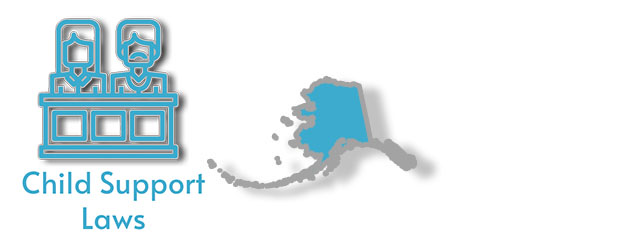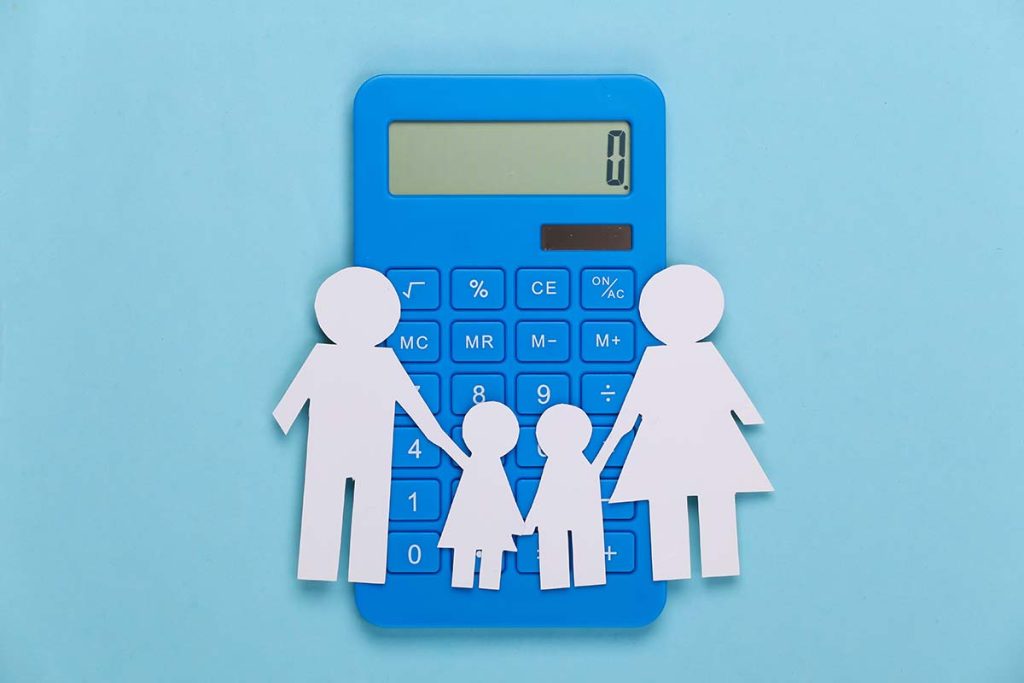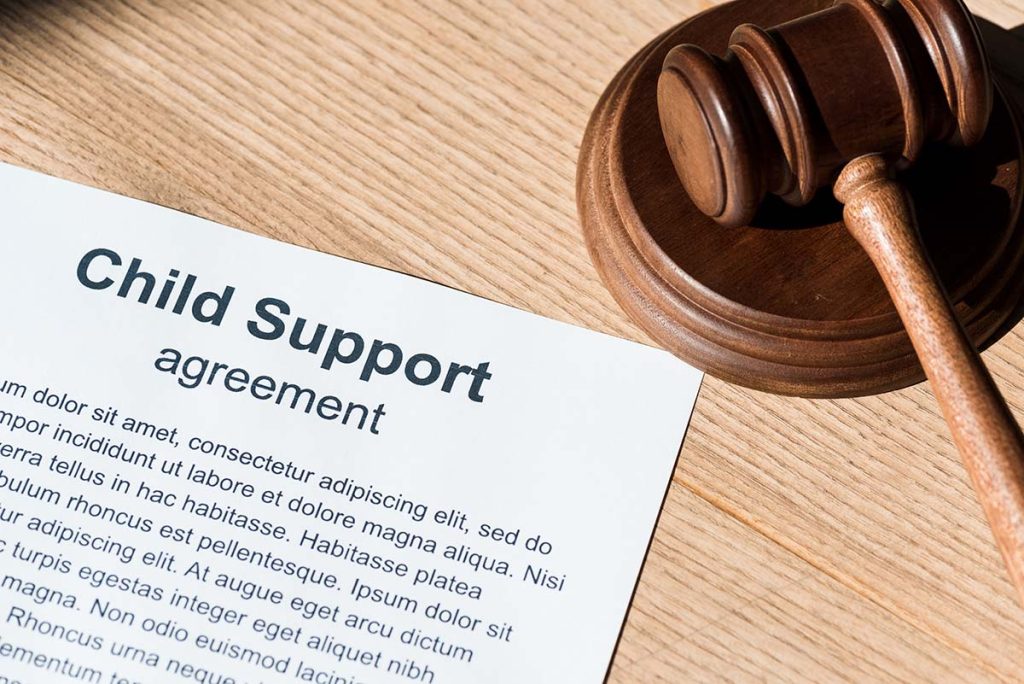
The most important factor in determining child support in Alaska is your income. Why? Unlike many states that favour the “income share method”, Alaska uses the “percentage income method” to calculate each parent’s financial obligation. That means you need your partner’s income information.
This raises the question…
How is Child Support Calculated in Alaska?
Before you decide to take matters to court, it is important to realize that Alaskan child support laws encourage mutual support agreements between parents. Meaning if you can keep it civilized, there might not be a need for legislation. However, agreements made verbally out of court are not considered binding, this means there is a lot of room to get a bad deal…especially if you are the custodial parent.

That being said-
Alaska uses the ‘percentage of income method’ to calculate child support. The formula requires a set percentage of the non-custodial parent’s income to be paid to the custodial parent each month. Furthermore, the percentage doesn’t always remain the same, meaning it may increase or decrease as time goes by.
Let’s assume that the non-custodial parent rakes in $2000 a month. If your former partner takes you to court claiming child support, the court may order a flat 27% of income for one child in the primary custody of the other parent, which means a monthly obligation of $500 a month. The mandatory minimum for child support of the non-custodial parent is $50 a month ($600 a year). Alaska child support guidelines also take into account the amount of time spent with each parent.
Calculating Child Support Has 3 Components:
Income
Number of Children
Percentage of Time Each Parent Has Physical Custody
Sound complicated? It can be! Child support is calculated on a case-to-case basis with a mandatory minimum. Luckily Alaska provides us with some tools for calculating child support based on the type of custody arrangement you are in.
The 4 Basic Custody Arrangements in Alaska

Primary Physical Custody:
The child spends 70% of the year with one parent. A primary custody arrangement is the most straightforward calculation for child support payments. The basic formula is (Adjusted Income) x (Number of Kids), where each additional child results in a smaller portion of income.
- 1 Child is 20% of income.
- 2 Children is 27% of income.
- 3 Children is 33% of income.
- Each additional child is an additional 3% (4 is 36%, 5 is 39%)
The minimum child support payment is $50 per month regardless of income, and child support payments are capped at an adjusted income of $126,000 (2022). This means an income over $126,000 is not used in the calculation.
Shared Physical Custody:
Each parent gets 30% (or more) of the year with the child. A shared custody arrangement is a bit more complicated because it considers income, number of children, and percentage time spent with each parent. Because of the extra complications, the Alaska Court System has a Shared Physical Custody Calculator – DR – 306 which allows you to input all relevant information and give you the expected payments.
Divided Custody:
Applies when there is more than one child in the relationship, whereby one parent gets custody of one or more children, and the other gets primary custody of the other kids. In calculating for divided custody the child support payments are calculated based on both parent’s income, so usually, the higher-earning parent will pay an amount to the other parent. Alaska has a Divided Custody Calculator – DR-307 that allows you to input all relevant information to get the expected payments.
Hybrid Custody:
This is a mix of the plans mentioned above. This allows for flexibility in your parenting plan but can also be the most complicated. It’s advisable to work with a lawyer to figure out what works best for you. Alaska provides a Hybrid Custody Calculator – DR – 308 to view expected payments.

Additionally, health care coverage and reasonable health care expenses not covered by insurance can be added to these custody arrangements.
Note- Alaska child support laws allow you to modify custody, visitation rights, and child support DIY style. Sounds silly, but it works! What you have to do is get yourself a DIY kit called ‘pro-se-packet’, which is a self-help packet designed to help you represent yourself without a lawyer, but remember, the argument you present in court has to stand on its feet. Consequently, this is an option, but, let me emphasize “no one except an attorney is better suited to advice you about your legal rights”.
Factors that determine child support obligation in Alaska

As mentioned above, income is the most important factor in determining child support in Alaska, but what is considered income?
Legally, ‘income’ captures way much more than your wages, that means if you are on disability, social security disability insurance (SSDI), receive employer benefits or nontaxable benefits such as specialty pay, cost of living allowance, rations, military allowance, and so on… all that is considered income.
On the other hand, payments from need-based public benefits and one-time lump-sum payments are not considered income.
What happens if you don’t pay child support in Alaska?
The last few years have been a bit crazy for most, so if you find yourself unable to make child support this month, this is what you have to do.
First, understand that in Alaska Retroactive modifications cannot be made on child support, but what you can do if say you lose your job or go to jail is contact CSSD (Child Support Services Division) and modify future payments. The idea is to inform them of your current situation and push for modification.
Note – Whether or not you live in Alaska, child support must be paid. Thus, it is not optional and cannot be waived unless a DNA test proves otherwise. Furthermore, missed payments will trigger enforcement or punitive measures such as:
- Your IRS tax refunds may be intercepted.
- You will be reported to credit bureaus making it difficult to secure loans and your mortgage may be impacted.
- Child support may be garnished directly from your wages, retirement benefits, unemployment, or on all your sources of income.
- Your assets may be intercepted.
- Funds can be obtained directly from your bank account.
- If the amount exceeds more $2500, your passport may be denied, suspended, or revoked.
- Liens may be placed on your cars or property.
Child support arrears or missed payments are collected at a small claims court via wage garnishment or mediation. Consequently, if you willfully and intentionally fail to pay child support in Alaska you may face “civil contempt of court” charges that may carry upwards of $5000 in penalties for each violation.
Alaska Child Support Enforcement

On the flip side, if you are a custodial parent looking to receive the financial support you are owed, you can seek assistance from the Child Support Services Division (CSSD). If you contact them, they will be able to help you in a multitude of ways.
If child support obligations are not met, then the CSSD has the ability to:
- Garnish the noncustodial parent’s income in the form of unemployment benefits, retirement benefits, wages, or other income.
- Withhold their state or federal income tax refunds.
- Transfer money directly from their bank account.
- Place a lien on any property the noncustodial parent might have. This means that you must be paid before they can sell or refinance their possessions/property.
- Take away their drivers licence and/or passport until they pay
- Report the delinquency to credit agencies which will make obtaining loans or credit more difficult
If you think that the other parent is being deliberately obtuse in their decision not to provide financial support, you may also get a court order. You or your counsel can file a ‘Motion and Affidavit to Enforce Order’ and the ‘Order on Motion’ (Forms SHC-1540 and SHC-1302). This will result in a judge holding a hearing to question the other parent as to why they have not been able to pay support. The judge has the same ability to enforce child support orders but additional powers in that if they find the other parent in contempt, they can charge them additional fines or jail time.
Is There a Statute of Limitations on Child Support Payments That are in Arrears?
NO, there is no statute of limitations on the collection of child support in Alaska. Additionally, if you miss child support payments, interest will accrue at a rate of 6% each year.
It is also worth noting that non-custodial parents have rights too, meaning, even if the non-custodial parent is unable to pay alimony, the custodial parent cannot withhold visitation rights. Of course, this raises the question, what if my former partner was abusive?
In such a situation or if it’s established that the non-custodial parent presents a clear and present danger to you or your kids… such as violence or sexual assault. The CSSD is required to keep your employment, contact, and all other identifying information from the abusive parent when enforcing a child support order.
If you are the one paying alimony, it is vital to keep records as proof of all payments made. This will help you avoid arrears claims and many other issues.
On the bright side, you can sign a written reduction agreement if you and your partner agree to reduce arrears and neither was receiving public assistance from the state.
What happens if a Parent is Held in Contempt- Can you go to jail for not paying Child Support?
Yes, you can go to jail. If a judge holds a parent in contempt of court for not following a child support order, then the judge may levy several punishments such as a fine of up to $5,000 or even jail time. Remember, the judge has the authority to use the same enforcement tools as CSSD. The somewhat good news is a hearing will be held to question why the non-custodial parent hasn’t been paying child support, so they better have a good reason!
Note that in Alaska, the mandatory minimum for non-custodial parents is $50 per month or $600 per year. Thus, even if you are unemployed or in jail, you still have to pay alimony. On top of that, you are responsible for paying a portion of health insurance or other reasonable healthcare costs.
The point is, whether you are paying or receiving alimony, CSSD, Child Support Services Division is your best source for resources and legal help! All you have to do is apply for services here and someone will contact you.
What if my former partner denies visitations?
If the custodian “willfully and without excuse” refuse to permit visitation, he or she may be fined $200 for each failure. That is according to sec. 25.20.140. of Alaska’s 2019 statutes.
Additional Reading: CPS Case Laws – How long does a CPS conviction stay on your record?
How Long do you Have to Pay Child Support in Alaska?
18 is the age of emancipation in Alaska. Consequently, you start paying alimony after divorce or any other legal gesture that declares your marriage illegitimate as soon as your partner asks for service from CSSD. The amount the court requires you to pay will depend on who has custody and your incomes. Furthermore, the court might warrant automatic deductions from your wages in some instances. But that depends on who was at fault for the divorce.
But don’t forget, alimony in Alaska also depends on how long your marriage lasts and social and monetary commitment exhibited by both parents. That means if you come out of a divorce severely or unreasonably depleted asset wise. The judge will consider your situation when making the judgment.
Who is the father?
Alaskan child support laws are unique in that if you are married to the mother when she procreates, your name will be put on the birth certificate whether or not you are the biological father. Accordingly, the court allows either parent to file a case in court and request a paternity test. Furthermore, the CSSD is allowed to conduct DNA testing or request an affidavit of paternity from both parties.
Generally speaking, to keep paternity issues from snowballing and costing you plenty of money, always ask for a paternity test when unsure!
How do I Stop Child Support in Alaska?
As mentioned, child support ends when a child becomes emancipated, usually at 18 (Or 19 if unmarried and in school finishing high school/technical or vocational training). However, Alaska’s statute AS 9.55.590 says the child has to be at least 16 years of age, meaning, if your argument is right, you can get out of a child support agreement earlier if the child:
- Is capable of supporting him/herself.
- Is 16 or 17 years old.
- The child currently resides separately and apart from guardians or parents.
- Each parent or guardian consents.
Remember, this is a very serious step that’s hard to reverse, so make sure you understand what you are getting into before signing anything. My advice, consult with a counsellor or lawyer throughout the process.
Alaska Child Support Laws Summary

Overall, Alaska uses the percentage income method in combination with the number of children and time spent to determine parental obligation.
So, we advise you to consult with a counsellor or attorney in your area to better understand your financial and emotional obligation to your child. You should also understand your rights!
Therefore, if you have any questions, you can contact a lawyer for a free consultation.
More Alaskan Laws